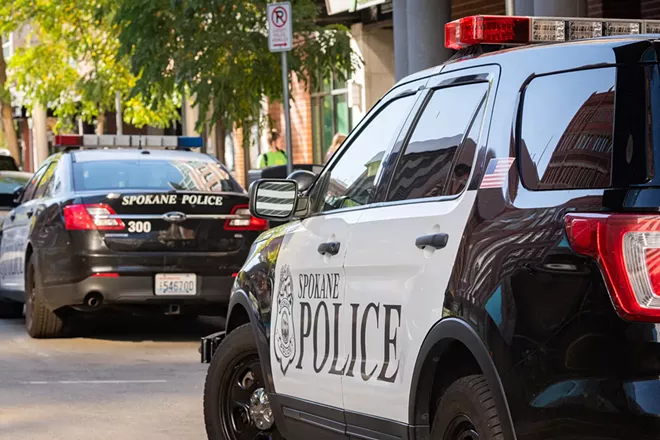Over the past three years, police departments across the country have reported challenges with staffing and attracting new recruits. Along with the broader economic factors, many police chiefs blamed the political climate and rhetoric stemming from the Black Lives Matter protests in 2020, including Spokane Police Chief Craig Meidl.
"I think it caused a lot of people to second-guess whether they would want to make a career out of law enforcement with that level of scrutiny," Meidl says.
But while the Spokane Police Department reports ongoing staffing challenges, data shows that the number of applications has been steadily rising — even amid the marches and calls to reform the police.
In 2022, 839 aspiring officers who took public safety tests across the country chose Spokane as one of the agencies to send their scores to. That's up from 771 in 2021, and way up from the number of people who sent their scores in 2020 and 2019, with 465 and 414 respectively.
The public safety test is only the first step of the hiring process. But even when narrowed down to the number of people who actually followed through and submitted paperwork to the city's Civil Service Commission, the data still shows a steady increase in interest.
"We are blessed that we are getting a good number of candidates," says Jacqui MacConnell, director of strategic initiatives with Spokane police.
MacConnell says the increase over the past two years is partially the result of a grant from the state Criminal Justice Training Commission, which allowed the department to send more recruiters to public safety tests.
Jacquelyn Valencia, who does recruitment work for the department at public safety tests, says she'll generally try to pitch potential recruits by highlighting Spokane's climate, outdoor recreation and general livability. She'll also point to the pay: New officers can expect an annual salary of more than $90,000 after three years on the force.
Then there's the political climate.
"We have a good reputation of living in a community where the vast majority of people support our police department," says Julie Humphreys, a department spokesperson. "And that doesn't go unnoticed, especially after what happened in 2020, after George Floyd."
The department saw a surge in hires from other police departments, like Seattle's, after the protests. Meidl says he'll frequently hear from new hires who say Spokane's pro-law enforcement reputation was a big draw.
The rising number of applicants doesn't necessarily mean the department's staffing problems are solved. In early January, the department moved dozens of officers to its patrol division as part of a reorganization to improve response times. Spokane police are stretched thin, Meidl says, not necessarily because of trouble attracting recruits, but because of the department's City Council-authorized staffing level of 356 commissioned officers, which he says is too small for Spokane's population of 230,000.
Meidl says there are currently about 15 vacancies, which is not unusual given the size of the force, but still not ideal. When an officer retires, it can take more than a year to replace them.
MacConnell says the department used to hire one in every 10 entry-level applicants. But over the past few years, that number has become more like one in every 18 to 20 applicants, because an increasing number of people have something in their background that disqualifies them from law enforcement, MacConnell says.
"I think some of the behaviors that people don't think are going to be disqualifying... are unfortunately becoming more acceptable in general society," MacConnell says.
Cannabis has been legal for more than a decade in Washington, but if you've used it more than 25 times, you can't be a Spokane cop. (Using any hallucinogenic drug over the past 10 years is also a disqualifier. So is using cocaine more than five times regardless of the time frame, or injecting it just once.)
MacConnell isn't sure what the most common disqualifiers are — they've all increased across the board. Some have to do with professional standards or character. She cites examples, like an applicant showing up to a virtual interview in pajamas or a recruit who told her that "the people I hang out with aren't so great."
In an effort to attract more qualified applicants, the Spokane Police Department is hoping to expand its outreach to young people. Valencia says the police want to start going to more high schools to tell students about the benefits of a career in law enforcement — and warn them about keeping their act together. ♦

